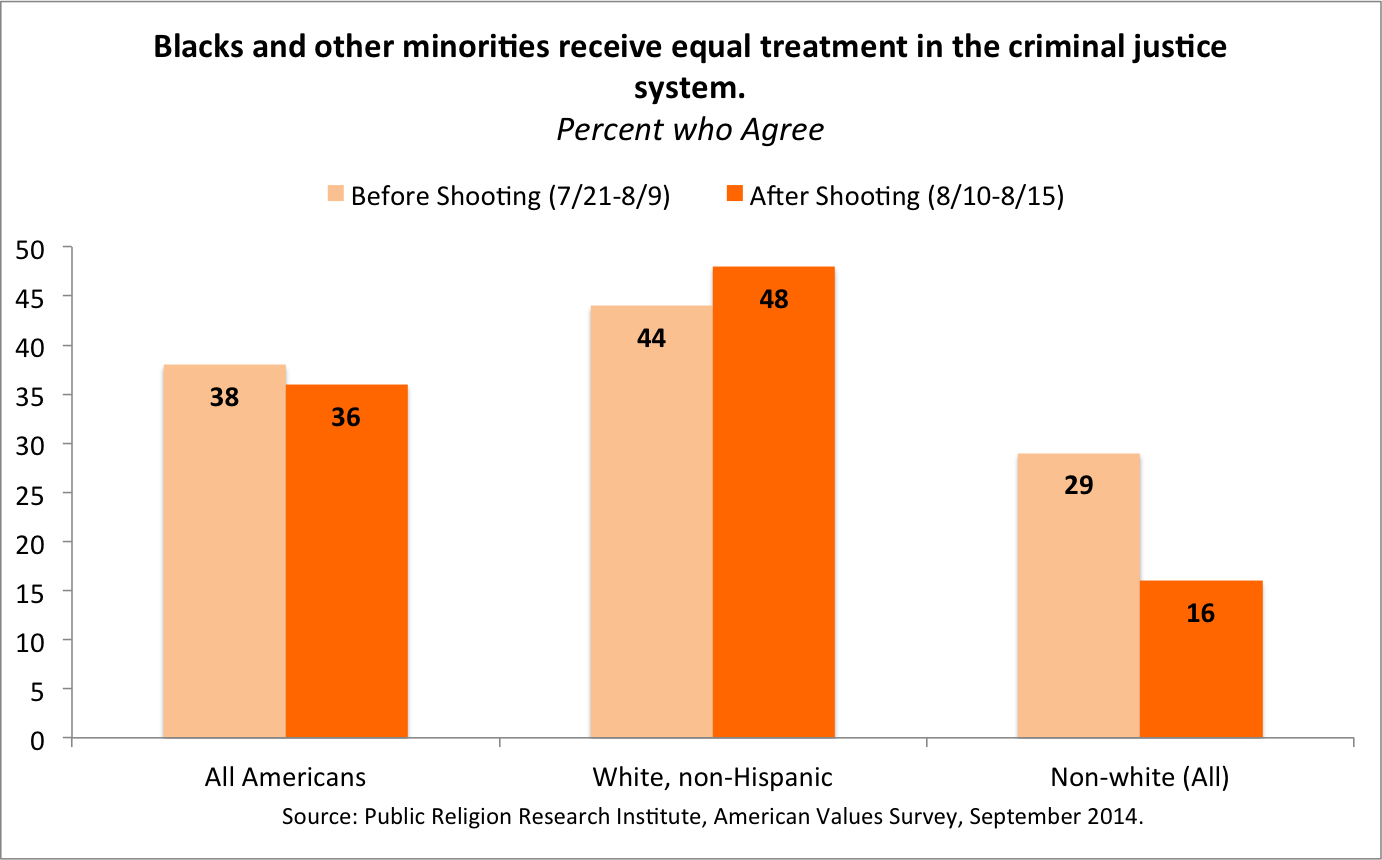On September 23, 2014, Public Religion Research Institute released our 2014 American Values Survey at an event hosted by The Brookings Institution. As we analyzed the findings, we discovered that the survey contained a rare snapshot of the racial divide between white and non-white Americans before and after the August 9th shooting of Michael Brown in Ferguson, Missouri.
Because of the survey’s large size, the survey had a long field period, from July 21 through August 15, including six days of interviews with nearly 500 Americans following Brown’s death. A survey question about whether black Americans and other minorities receive equal treatment in the criminal justice system vividly captured the strikingly different reactions of white and non-white Americans to the shooting.

Before the shooting, based on nearly 1,800 interviews, the survey showed a 15-point gap between the attitudes of white and non-white Americans. Forty-four percent of white Americans agreed that blacks and other minorities receive equal treatment in the criminal justice system, a sentiment shared by less than three-in-ten (29 percent) non-white Americans. In data collected over the six days immediately following the shooting, however, this gap between white and non-white Americans more than doubled to 32 points. There was no statistically significant difference in white Americans’ attitudes about the fairness of the criminal justice before the shooting (44 percent agreed) and after the shooting (48 percent agreed). Among non-white Americans, however, trust in the racial fairness of the criminal justice system fell 13 percentage points, from 29 percent before the shooting to only 16 percent after the shooting. After Ferguson, nearly seven-in-ten (69 percent) non-white Americans disagreed that blacks and other minorities receive equal treatment in the criminal justice system.
Although there is no gender gap among whites on this question, whites are strongly divided in their perceptions of the fairness of the criminal justice system by age, social class, and party affiliation. While only 38 percent of white Millennials (age 18-34) and 34 percent of college-educated whites agree that the criminal justice system is fair to racial minorities, 57 percent of whites who are part of the Silent generation (age 69 and over) and half (50 percent) of white working-class Americans agree. The partisan divides are equally as large. Only about three-in-ten (31 percent) white Democrats say racial minorities get a fair shake in the criminal justice system, compared to nearly six-in-ten (57 percent) white Republicans.
This disconnect between many white Americans and non-white Americans on Ferguson is also driven by where Americans get their information. White Americans are more likely to name Fox News (27 percent) than any other television news outlet as the network they most trust to give them accurate information on current events and politics. Nearly six-in-ten (58 percent) whites who most trust Fox News agree that blacks and other minorities are given equal treatment in the criminal justice system. This level of agreement is 14 points higher than among whites who most trust broadcast news such as NBC, ABC, or CBS (44 percent), 19 points higher than among whites who most trust CNN (39 percent), 26 points higher than among whites who most trust public television (32 percent), and 35 points higher than among whites who most trust The Daily Show with Jon Stewart—who harshly criticized Fox News for questioning whether there was a racial factor in the shooting—or The Colbert Report (23 percent).
Finally, as I recently noted in a piece for The Atlantic, even if whites didn’t solely rely on the television news for their information, few whites have non-white members in their core social networks.* White Americans’ core social networks are on average 91 percent white, and three-quarters (75 percent) of whites have entirely white core social networks. Simply put, few whites have non-white friends who are close enough to discuss charged issues like Ferguson.
Given these divides, it is difficult to know just how white and non-white Americans might have a meaningful conversation about race and inequality in America. This much, however, seems clear. Like an afterimage, the snapshot of Americans this poll captured six days after Ferguson will likely linger with us for some time.
*In this analysis, PRRI followed an approach developed in the General Social Survey (GSS). Respondents’
core social networks
were mapped by asking them to name up to seven people with whom they had “discussed important matters” in the past six months.
The Brookings Institution is committed to quality, independence, and impact.
We are supported by a diverse array of funders. In line with our values and policies, each Brookings publication represents the sole views of its author(s).




Commentary
Six Days After Ferguson: America’s Racial Disconnect in One Chart
September 30, 2014